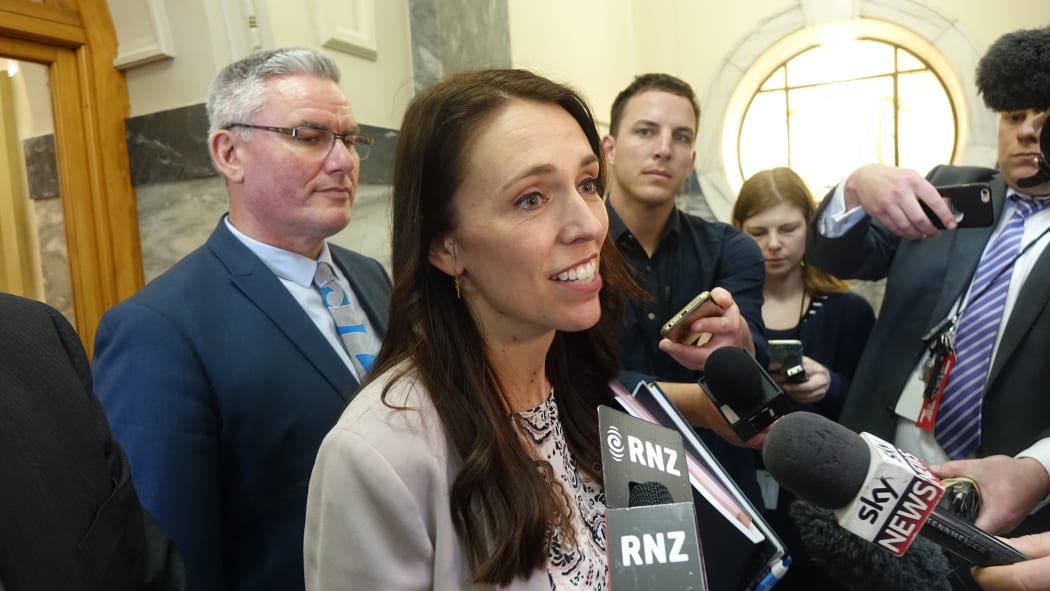Opinion - We sometimes forget, I think, that our system is designed to elect a Parliament and not, necessarily, a government.

National Party leader Bill English leaving Parliament after the first day of coalition discussions with New Zealand First. Photo: RNZ / Craig McCulloch
This is not just an innovation of MMP: the origins of what we came to call first past the post were actually the same.
It was only when the era of iron party discipline developed in the 20th century that the system became a race between the blue team and the red team. With the special votes from election 2017, New Zealand now has a Parliament - its 52nd - which reflects a certain nationwide ambivalence.
Politicians and political activists, with their penchant for unnecessary drama and soundbites, have, I think, sketched the result of the election in too crude a colour scheme.
It is not a vote for change, at least not a particularly radical one. The claim from opposition parties that there is a mandate for a drastic change is nonsense: 37 percent support for the leading opposition party, Labour, does not denote anything like widespread dissatisfaction.
The drop in support of the main governing party, though, does indicate some dissatisfaction with the status quo. National, at slightly above 44 percent of votes cast, might be the largest party but it has seen its support erode.
And of course it has few friends in Parliament: Peter Dunne and the Māori Party have gone (although the Māori Party, if it were still there, would probably have supported Labour this time), and ACT remains David Seymour and a mix of hopes and nostalgia.

Labour Party leader Jacinda Ardern told reporters after today's meeting with New Zealand First that the talks were "excellent" and "productive". Photo: RNZ / Craig McCulloch
One of the most important messages of new Labour leader Jacinda Ardern was less the "relentless positivity" fluff than her line, "we can do better." I think that is a widespread feeling amongst New Zealanders, across the political spectrum.
There is an often-unarticulated feeling that the prospects for New Zealand are the best they have been for a very long time. I would go even further: New Zealand is, as former prime minister John Key was much-mocked for saying, "on the cusp of something special".
The country has enjoyed economic prosperity in the past, but it was prosperity bought by being an economic colony of the United Kingdom and bought at the cost of a stifling conformity which repelled our best and brightest.
Our best and brightest are now less inclined to leave - and many who have left are coming home.
And for those who still leave, the feeling is different. For a couple of generations, the feeling was of leaving a country which was heading down an economic and social cul de sac, and headed for ruin.
That isn't the feeling now: it is more the natural desire to see the rest of a big wide world. The challenges - the areas we can do better in - cut across the pre-occupations of the political spectrum.
Economic productivity is poor, partly because successive governments have paid too little attention to skills development and have also allowed our education system to churn out too many leavers who cannot do basic reading or maths. Both are being addressed with greater urgency now, but this will take a generation to turn around.
There is too much money going into property and not enough into other business.
The homelessness issue is the visible part of a mix of, again, complacency and welfarist neglect by successive governments. It perhaps bugs people more than most of these issues because the sight of beggars in the main street offends our sense of being Kiwi. This isn't supposed to happen in New Zealand.
Less physically visible, but similarly emotive, is the issue of water quality and conservation. Again, this hits at the national identity nerve: we've taken it for granted for so long that we live in a clean green paradise the news of polluted, unswimmable rivers is something profoundly un-Kiwi.
As for what the new Parliament will make of this: it is anyone's guess right now.

New Zealand First leader Winston Peters (right) emerging from today's talks with National. Photo: RNZ / Jane Patterson
And by 'anyone' I don't necessarily mean Winston Peters. Yes, the New Zealand First leader gets to call the shots over who forms the next government, and there is of course much mulling over whether he and his party are a better fit for the Left or the Right.
Mr Peters is no-one's idea of a progressive. Essentially, he is a throwback: his party is a mix of Old National and Old Labour.
And he is certainly out of step with the newly confident, outward looking, and less protectionist - economically or emotionally - 21st century New Zealand. That means he is not an easy fit with National or with the Greens, although he has more in common with Labour than perhaps many Labourites are comfortable admitting.
And it also means the much mentioned 'crossbench option' - keeping New Zealand First out of a formal coalition, but bargaining for support on a measure by measure basis - is much more attractive to him than it has been in the past, especially as, without ministerial duties, he will have the time to build up New Zealand First as a viable long-term force which will survive his departure from politics.
The big question is whether his own caucus, some of whom very much want to be cabinet ministers, will be happy to sit on the cross benches with him.
* Rob Hosking is a freelance journalist specialising in economic, tax, financial and superannuation issues, and regulatory/legal matters. He is a regular contributor to NBR.





